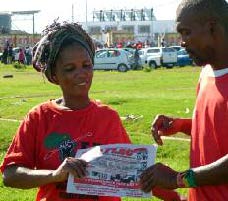
At work I overheard two of my colleagues debating about the land issue in South Africa and in Africa at large. One was raising a point that South African land should be returned to its rightful people (blacks). He continued by saying, “We are poor because our means of production are owned by white monopoly capitalists. If only the land can be owned by the state, then everyone will benefit from its wealth.”
X disagreed with this concept. He pointed out that white people have expertise in handling natural resources better than black people. He made an example of Zimbabwe. He said, “Robert Mugabe took the land and all the natural resources from whites and chased them away. Look how Zimbabwe is now. Black people lack the expertise to produce peoples’ needs. All the means of production in Zimbabwe are owned by blacks but still black people are hungry.”
Y raised an issue about Zimbabwe being financially destabilized through investment by foreign countries and thus this makes Zimbabwe’s economy impossible to grow. This discussion escalated from being a poverty issue to a racism issue.
Y was blaming whites for blacks’ poverty and X was blaming blacks, saying black people are lazy, black people want to go to school and refuse to work hard.
I got involved in this conversation by saying, “white people are not to blame for our poverty, neither are blacks.” I said that “the fundamental cause of poverty is capitalism itself.”
Y agreed, saying that we should replace capitalism with an African socialist state.
I had to emphasize how dangerous a socialist state is. “The problem in capitalism is the exploitation of the working class,” I said. I continued by saying, “Yes, all means of production will be owned by the black state. You will work for a black government, just like you’re working for a white man today, and exploitation will not differ whatsoever. In a black socialist state, it will be black-on-black exploitation.
I said that an answer is communism. A society without money. They did not understand how people can survive without money. We did not get further or deal with communism more because we were on duty. I do have Y’s number and I look forward to discuss communist ideas with him. I invited him to our meeting, but he couldn’t make it.
There is hope for communism. People are beginning to recognize the flaws of capitalism. And as communists we need to take such opportunities to win them to our side. Forward with communism!
—Comrade in South Africa

